LAW011-1: Business Law Report on Sole Director and Contracts
VerifiedAdded on 2022/12/29
|11
|3626
|66
Report
AI Summary
This report analyzes key aspects of business law, addressing three main areas. Part 1 examines the legislative provisions governing the role and responsibilities of a sole director, referencing sections 172-177 of the Companies Act 2006, and emphasizing duties such as acting in good faith, promoting the company's business, and avoiding conflicts of interest. Part 2 delves into the termination of employment contracts, covering grounds for termination, notice periods, instant dismissal, wrongful dismissal, and severance pay. It also examines the circumstances surrounding Gemma's ability to terminate an employee's contract. Finally, Part 3 explores alternative solutions for dispute resolution, offering insights into how to resolve conflicts. The report provides a comprehensive overview of legal principles relevant to business managers.
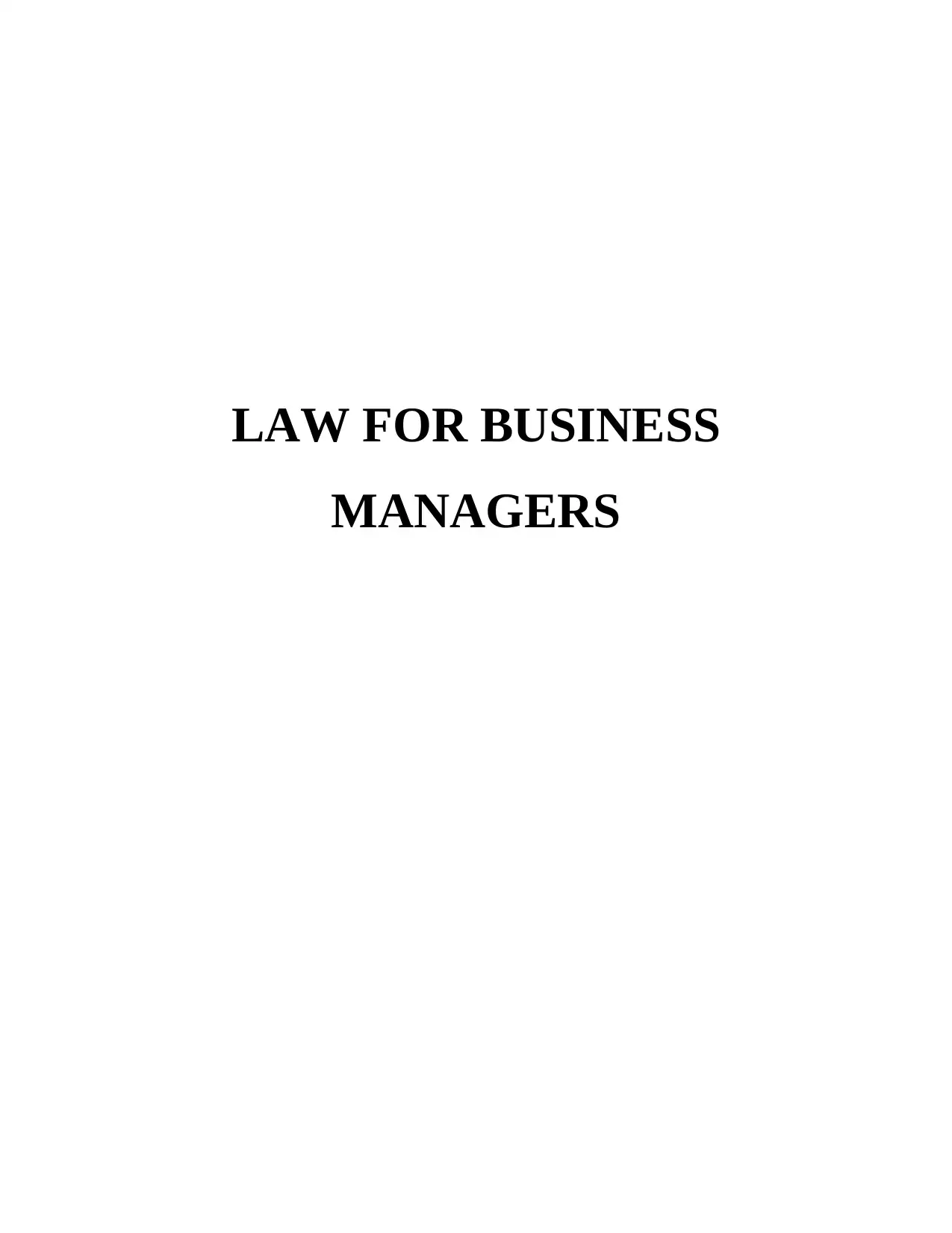
LAW FOR BUSINESS
MANAGERS
MANAGERS
Paraphrase This Document
Need a fresh take? Get an instant paraphrase of this document with our AI Paraphraser
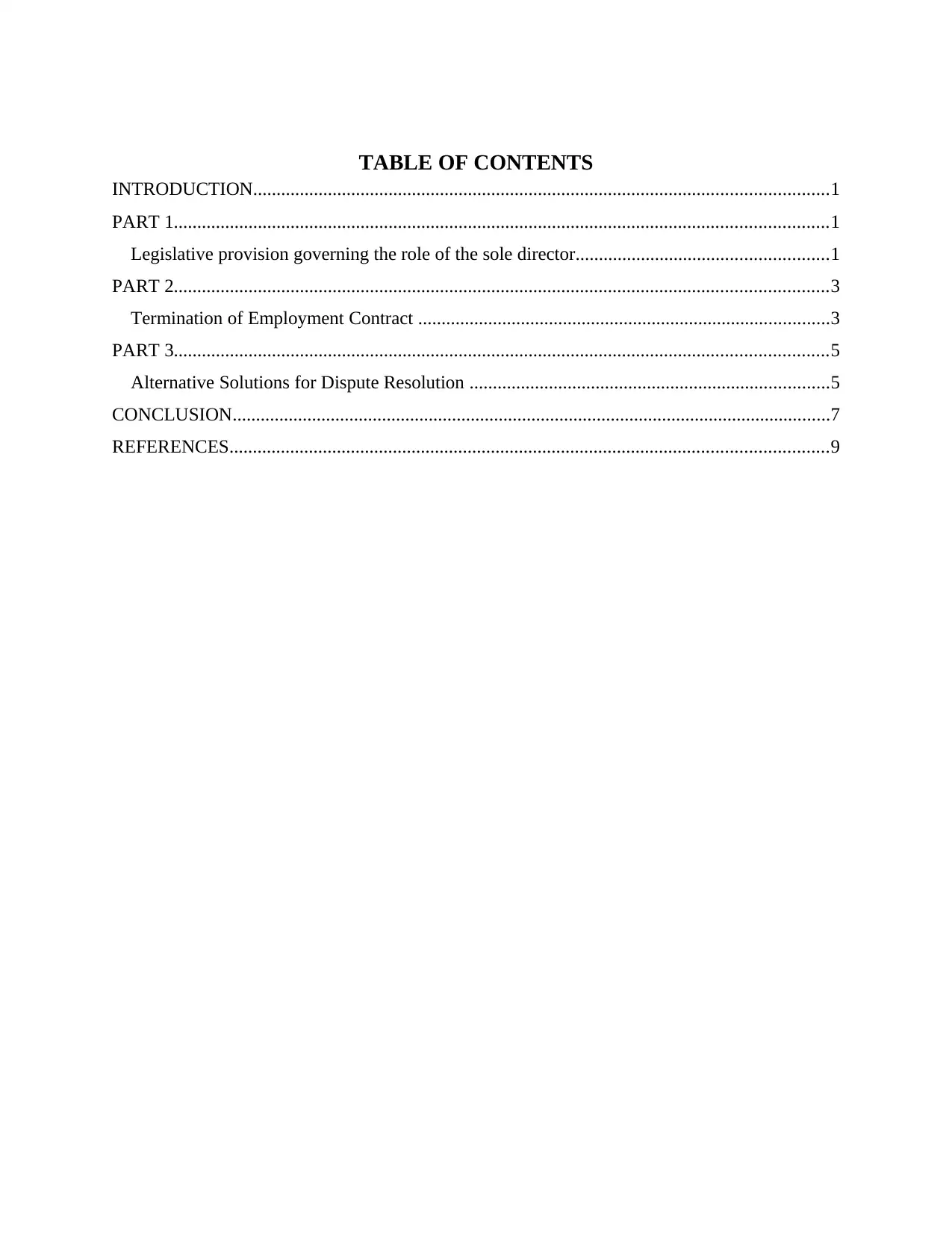
TABLE OF CONTENTS
INTRODUCTION...........................................................................................................................1
PART 1............................................................................................................................................1
Legislative provision governing the role of the sole director......................................................1
PART 2............................................................................................................................................3
Termination of Employment Contract ........................................................................................3
PART 3............................................................................................................................................5
Alternative Solutions for Dispute Resolution .............................................................................5
CONCLUSION................................................................................................................................7
REFERENCES................................................................................................................................9
INTRODUCTION...........................................................................................................................1
PART 1............................................................................................................................................1
Legislative provision governing the role of the sole director......................................................1
PART 2............................................................................................................................................3
Termination of Employment Contract ........................................................................................3
PART 3............................................................................................................................................5
Alternative Solutions for Dispute Resolution .............................................................................5
CONCLUSION................................................................................................................................7
REFERENCES................................................................................................................................9
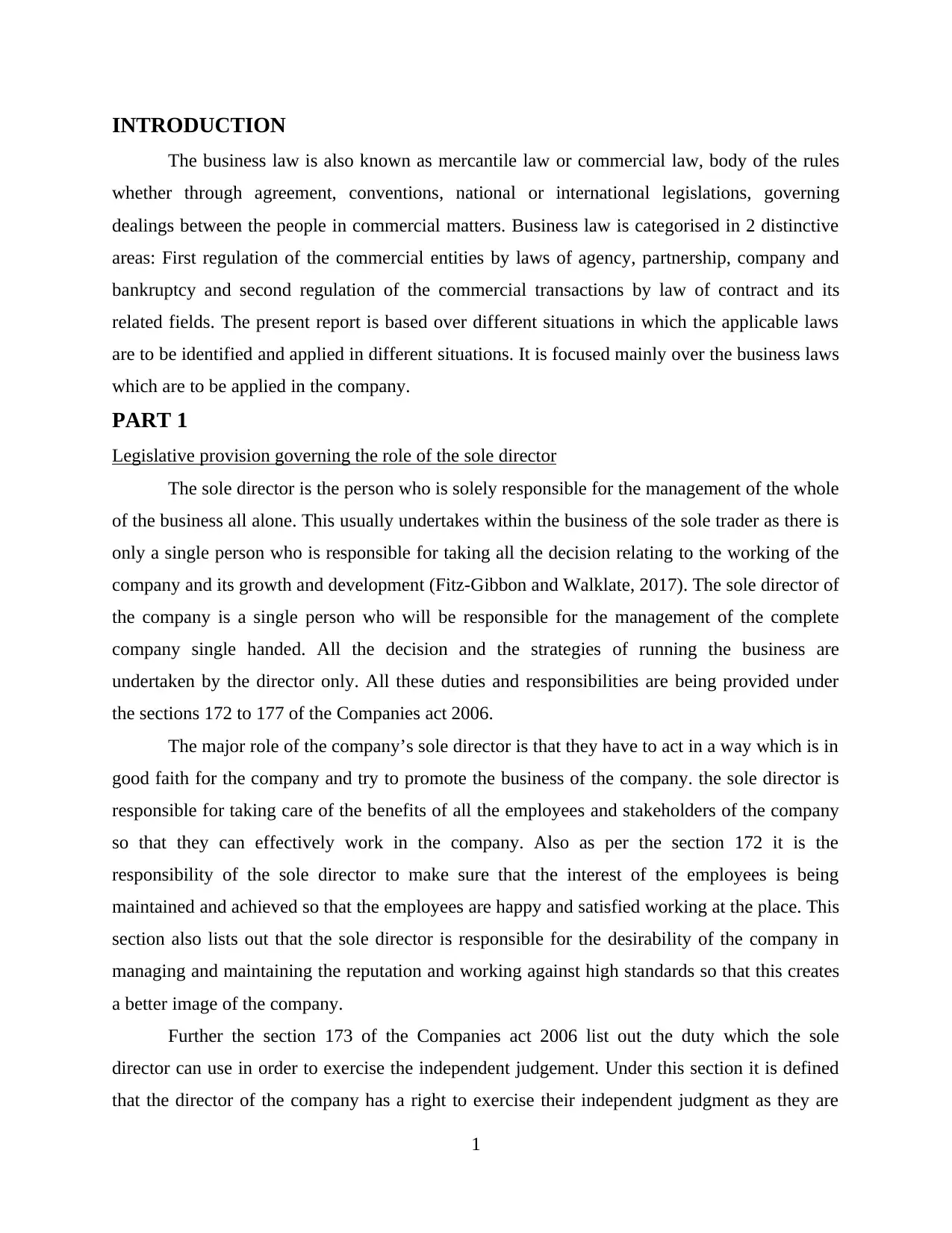
INTRODUCTION
The business law is also known as mercantile law or commercial law, body of the rules
whether through agreement, conventions, national or international legislations, governing
dealings between the people in commercial matters. Business law is categorised in 2 distinctive
areas: First regulation of the commercial entities by laws of agency, partnership, company and
bankruptcy and second regulation of the commercial transactions by law of contract and its
related fields. The present report is based over different situations in which the applicable laws
are to be identified and applied in different situations. It is focused mainly over the business laws
which are to be applied in the company.
PART 1
Legislative provision governing the role of the sole director
The sole director is the person who is solely responsible for the management of the whole
of the business all alone. This usually undertakes within the business of the sole trader as there is
only a single person who is responsible for taking all the decision relating to the working of the
company and its growth and development (Fitz-Gibbon and Walklate, 2017). The sole director of
the company is a single person who will be responsible for the management of the complete
company single handed. All the decision and the strategies of running the business are
undertaken by the director only. All these duties and responsibilities are being provided under
the sections 172 to 177 of the Companies act 2006.
The major role of the company’s sole director is that they have to act in a way which is in
good faith for the company and try to promote the business of the company. the sole director is
responsible for taking care of the benefits of all the employees and stakeholders of the company
so that they can effectively work in the company. Also as per the section 172 it is the
responsibility of the sole director to make sure that the interest of the employees is being
maintained and achieved so that the employees are happy and satisfied working at the place. This
section also lists out that the sole director is responsible for the desirability of the company in
managing and maintaining the reputation and working against high standards so that this creates
a better image of the company.
Further the section 173 of the Companies act 2006 list out the duty which the sole
director can use in order to exercise the independent judgement. Under this section it is defined
that the director of the company has a right to exercise their independent judgment as they are
1
The business law is also known as mercantile law or commercial law, body of the rules
whether through agreement, conventions, national or international legislations, governing
dealings between the people in commercial matters. Business law is categorised in 2 distinctive
areas: First regulation of the commercial entities by laws of agency, partnership, company and
bankruptcy and second regulation of the commercial transactions by law of contract and its
related fields. The present report is based over different situations in which the applicable laws
are to be identified and applied in different situations. It is focused mainly over the business laws
which are to be applied in the company.
PART 1
Legislative provision governing the role of the sole director
The sole director is the person who is solely responsible for the management of the whole
of the business all alone. This usually undertakes within the business of the sole trader as there is
only a single person who is responsible for taking all the decision relating to the working of the
company and its growth and development (Fitz-Gibbon and Walklate, 2017). The sole director of
the company is a single person who will be responsible for the management of the complete
company single handed. All the decision and the strategies of running the business are
undertaken by the director only. All these duties and responsibilities are being provided under
the sections 172 to 177 of the Companies act 2006.
The major role of the company’s sole director is that they have to act in a way which is in
good faith for the company and try to promote the business of the company. the sole director is
responsible for taking care of the benefits of all the employees and stakeholders of the company
so that they can effectively work in the company. Also as per the section 172 it is the
responsibility of the sole director to make sure that the interest of the employees is being
maintained and achieved so that the employees are happy and satisfied working at the place. This
section also lists out that the sole director is responsible for the desirability of the company in
managing and maintaining the reputation and working against high standards so that this creates
a better image of the company.
Further the section 173 of the Companies act 2006 list out the duty which the sole
director can use in order to exercise the independent judgement. Under this section it is defined
that the director of the company has a right to exercise their independent judgment as they are
1
⊘ This is a preview!⊘
Do you want full access?
Subscribe today to unlock all pages.

Trusted by 1+ million students worldwide
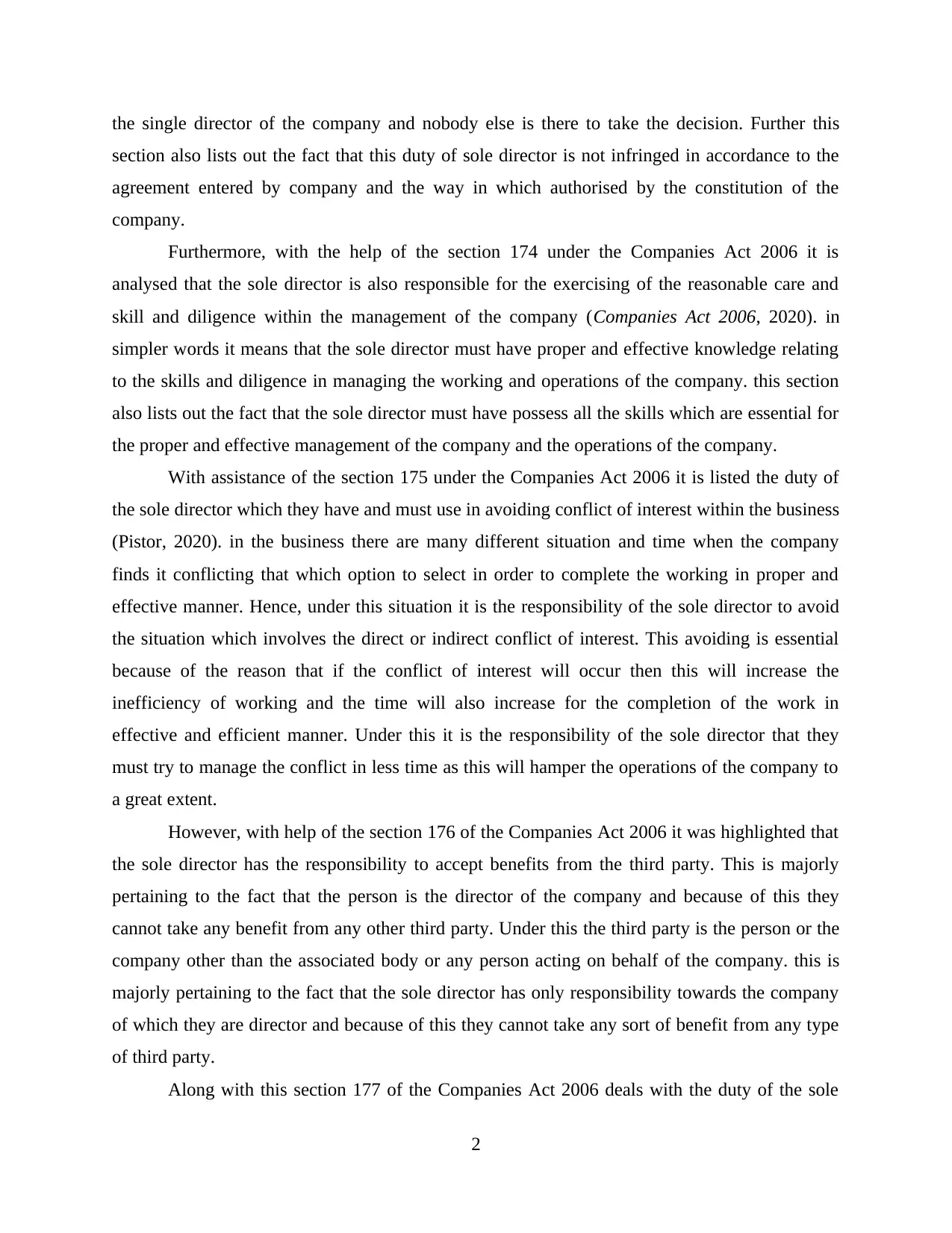
the single director of the company and nobody else is there to take the decision. Further this
section also lists out the fact that this duty of sole director is not infringed in accordance to the
agreement entered by company and the way in which authorised by the constitution of the
company.
Furthermore, with the help of the section 174 under the Companies Act 2006 it is
analysed that the sole director is also responsible for the exercising of the reasonable care and
skill and diligence within the management of the company (Companies Act 2006, 2020). in
simpler words it means that the sole director must have proper and effective knowledge relating
to the skills and diligence in managing the working and operations of the company. this section
also lists out the fact that the sole director must have possess all the skills which are essential for
the proper and effective management of the company and the operations of the company.
With assistance of the section 175 under the Companies Act 2006 it is listed the duty of
the sole director which they have and must use in avoiding conflict of interest within the business
(Pistor, 2020). in the business there are many different situation and time when the company
finds it conflicting that which option to select in order to complete the working in proper and
effective manner. Hence, under this situation it is the responsibility of the sole director to avoid
the situation which involves the direct or indirect conflict of interest. This avoiding is essential
because of the reason that if the conflict of interest will occur then this will increase the
inefficiency of working and the time will also increase for the completion of the work in
effective and efficient manner. Under this it is the responsibility of the sole director that they
must try to manage the conflict in less time as this will hamper the operations of the company to
a great extent.
However, with help of the section 176 of the Companies Act 2006 it was highlighted that
the sole director has the responsibility to accept benefits from the third party. This is majorly
pertaining to the fact that the person is the director of the company and because of this they
cannot take any benefit from any other third party. Under this the third party is the person or the
company other than the associated body or any person acting on behalf of the company. this is
majorly pertaining to the fact that the sole director has only responsibility towards the company
of which they are director and because of this they cannot take any sort of benefit from any type
of third party.
Along with this section 177 of the Companies Act 2006 deals with the duty of the sole
2
section also lists out the fact that this duty of sole director is not infringed in accordance to the
agreement entered by company and the way in which authorised by the constitution of the
company.
Furthermore, with the help of the section 174 under the Companies Act 2006 it is
analysed that the sole director is also responsible for the exercising of the reasonable care and
skill and diligence within the management of the company (Companies Act 2006, 2020). in
simpler words it means that the sole director must have proper and effective knowledge relating
to the skills and diligence in managing the working and operations of the company. this section
also lists out the fact that the sole director must have possess all the skills which are essential for
the proper and effective management of the company and the operations of the company.
With assistance of the section 175 under the Companies Act 2006 it is listed the duty of
the sole director which they have and must use in avoiding conflict of interest within the business
(Pistor, 2020). in the business there are many different situation and time when the company
finds it conflicting that which option to select in order to complete the working in proper and
effective manner. Hence, under this situation it is the responsibility of the sole director to avoid
the situation which involves the direct or indirect conflict of interest. This avoiding is essential
because of the reason that if the conflict of interest will occur then this will increase the
inefficiency of working and the time will also increase for the completion of the work in
effective and efficient manner. Under this it is the responsibility of the sole director that they
must try to manage the conflict in less time as this will hamper the operations of the company to
a great extent.
However, with help of the section 176 of the Companies Act 2006 it was highlighted that
the sole director has the responsibility to accept benefits from the third party. This is majorly
pertaining to the fact that the person is the director of the company and because of this they
cannot take any benefit from any other third party. Under this the third party is the person or the
company other than the associated body or any person acting on behalf of the company. this is
majorly pertaining to the fact that the sole director has only responsibility towards the company
of which they are director and because of this they cannot take any sort of benefit from any type
of third party.
Along with this section 177 of the Companies Act 2006 deals with the duty of the sole
2
Paraphrase This Document
Need a fresh take? Get an instant paraphrase of this document with our AI Paraphraser
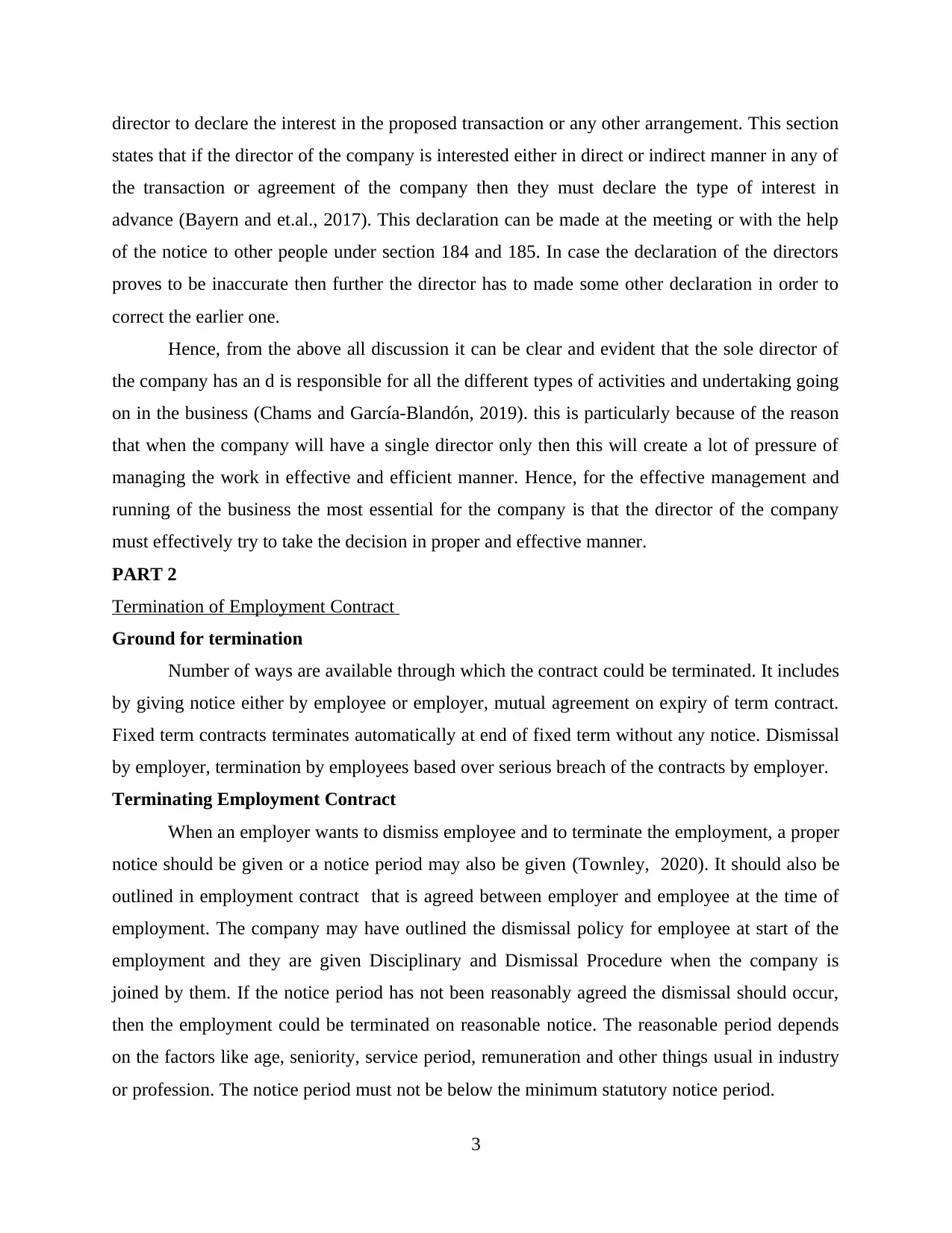
director to declare the interest in the proposed transaction or any other arrangement. This section
states that if the director of the company is interested either in direct or indirect manner in any of
the transaction or agreement of the company then they must declare the type of interest in
advance (Bayern and et.al., 2017). This declaration can be made at the meeting or with the help
of the notice to other people under section 184 and 185. In case the declaration of the directors
proves to be inaccurate then further the director has to made some other declaration in order to
correct the earlier one.
Hence, from the above all discussion it can be clear and evident that the sole director of
the company has an d is responsible for all the different types of activities and undertaking going
on in the business (Chams and García-Blandón, 2019). this is particularly because of the reason
that when the company will have a single director only then this will create a lot of pressure of
managing the work in effective and efficient manner. Hence, for the effective management and
running of the business the most essential for the company is that the director of the company
must effectively try to take the decision in proper and effective manner.
PART 2
Termination of Employment Contract
Ground for termination
Number of ways are available through which the contract could be terminated. It includes
by giving notice either by employee or employer, mutual agreement on expiry of term contract.
Fixed term contracts terminates automatically at end of fixed term without any notice. Dismissal
by employer, termination by employees based over serious breach of the contracts by employer.
Terminating Employment Contract
When an employer wants to dismiss employee and to terminate the employment, a proper
notice should be given or a notice period may also be given (Townley, 2020). It should also be
outlined in employment contract that is agreed between employer and employee at the time of
employment. The company may have outlined the dismissal policy for employee at start of the
employment and they are given Disciplinary and Dismissal Procedure when the company is
joined by them. If the notice period has not been reasonably agreed the dismissal should occur,
then the employment could be terminated on reasonable notice. The reasonable period depends
on the factors like age, seniority, service period, remuneration and other things usual in industry
or profession. The notice period must not be below the minimum statutory notice period.
3
states that if the director of the company is interested either in direct or indirect manner in any of
the transaction or agreement of the company then they must declare the type of interest in
advance (Bayern and et.al., 2017). This declaration can be made at the meeting or with the help
of the notice to other people under section 184 and 185. In case the declaration of the directors
proves to be inaccurate then further the director has to made some other declaration in order to
correct the earlier one.
Hence, from the above all discussion it can be clear and evident that the sole director of
the company has an d is responsible for all the different types of activities and undertaking going
on in the business (Chams and García-Blandón, 2019). this is particularly because of the reason
that when the company will have a single director only then this will create a lot of pressure of
managing the work in effective and efficient manner. Hence, for the effective management and
running of the business the most essential for the company is that the director of the company
must effectively try to take the decision in proper and effective manner.
PART 2
Termination of Employment Contract
Ground for termination
Number of ways are available through which the contract could be terminated. It includes
by giving notice either by employee or employer, mutual agreement on expiry of term contract.
Fixed term contracts terminates automatically at end of fixed term without any notice. Dismissal
by employer, termination by employees based over serious breach of the contracts by employer.
Terminating Employment Contract
When an employer wants to dismiss employee and to terminate the employment, a proper
notice should be given or a notice period may also be given (Townley, 2020). It should also be
outlined in employment contract that is agreed between employer and employee at the time of
employment. The company may have outlined the dismissal policy for employee at start of the
employment and they are given Disciplinary and Dismissal Procedure when the company is
joined by them. If the notice period has not been reasonably agreed the dismissal should occur,
then the employment could be terminated on reasonable notice. The reasonable period depends
on the factors like age, seniority, service period, remuneration and other things usual in industry
or profession. The notice period must not be below the minimum statutory notice period.
3
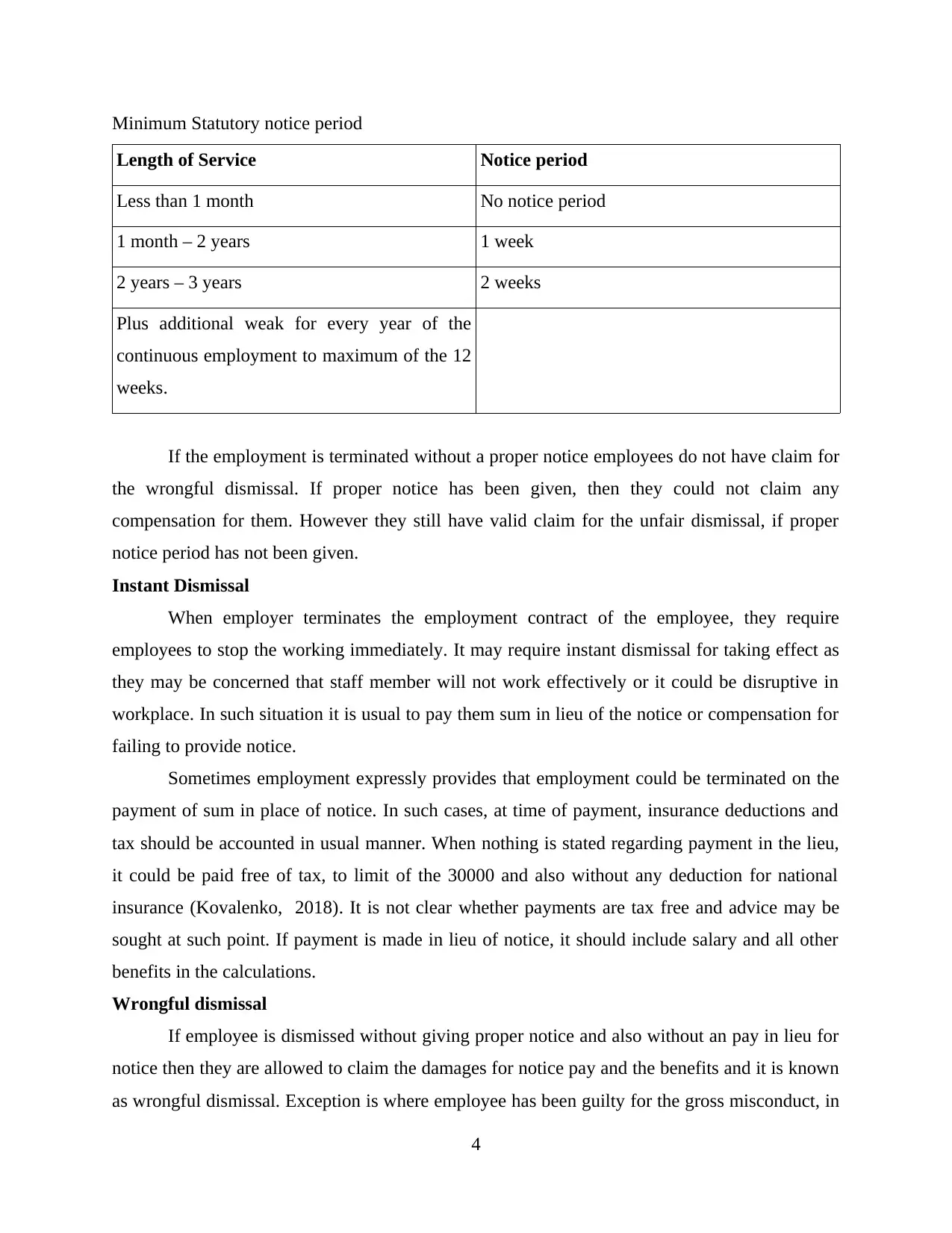
Minimum Statutory notice period
Length of Service Notice period
Less than 1 month No notice period
1 month – 2 years 1 week
2 years – 3 years 2 weeks
Plus additional weak for every year of the
continuous employment to maximum of the 12
weeks.
If the employment is terminated without a proper notice employees do not have claim for
the wrongful dismissal. If proper notice has been given, then they could not claim any
compensation for them. However they still have valid claim for the unfair dismissal, if proper
notice period has not been given.
Instant Dismissal
When employer terminates the employment contract of the employee, they require
employees to stop the working immediately. It may require instant dismissal for taking effect as
they may be concerned that staff member will not work effectively or it could be disruptive in
workplace. In such situation it is usual to pay them sum in lieu of the notice or compensation for
failing to provide notice.
Sometimes employment expressly provides that employment could be terminated on the
payment of sum in place of notice. In such cases, at time of payment, insurance deductions and
tax should be accounted in usual manner. When nothing is stated regarding payment in the lieu,
it could be paid free of tax, to limit of the 30000 and also without any deduction for national
insurance (Kovalenko, 2018). It is not clear whether payments are tax free and advice may be
sought at such point. If payment is made in lieu of notice, it should include salary and all other
benefits in the calculations.
Wrongful dismissal
If employee is dismissed without giving proper notice and also without an pay in lieu for
notice then they are allowed to claim the damages for notice pay and the benefits and it is known
as wrongful dismissal. Exception is where employee has been guilty for the gross misconduct, in
4
Length of Service Notice period
Less than 1 month No notice period
1 month – 2 years 1 week
2 years – 3 years 2 weeks
Plus additional weak for every year of the
continuous employment to maximum of the 12
weeks.
If the employment is terminated without a proper notice employees do not have claim for
the wrongful dismissal. If proper notice has been given, then they could not claim any
compensation for them. However they still have valid claim for the unfair dismissal, if proper
notice period has not been given.
Instant Dismissal
When employer terminates the employment contract of the employee, they require
employees to stop the working immediately. It may require instant dismissal for taking effect as
they may be concerned that staff member will not work effectively or it could be disruptive in
workplace. In such situation it is usual to pay them sum in lieu of the notice or compensation for
failing to provide notice.
Sometimes employment expressly provides that employment could be terminated on the
payment of sum in place of notice. In such cases, at time of payment, insurance deductions and
tax should be accounted in usual manner. When nothing is stated regarding payment in the lieu,
it could be paid free of tax, to limit of the 30000 and also without any deduction for national
insurance (Kovalenko, 2018). It is not clear whether payments are tax free and advice may be
sought at such point. If payment is made in lieu of notice, it should include salary and all other
benefits in the calculations.
Wrongful dismissal
If employee is dismissed without giving proper notice and also without an pay in lieu for
notice then they are allowed to claim the damages for notice pay and the benefits and it is known
as wrongful dismissal. Exception is where employee has been guilty for the gross misconduct, in
4
⊘ This is a preview!⊘
Do you want full access?
Subscribe today to unlock all pages.

Trusted by 1+ million students worldwide
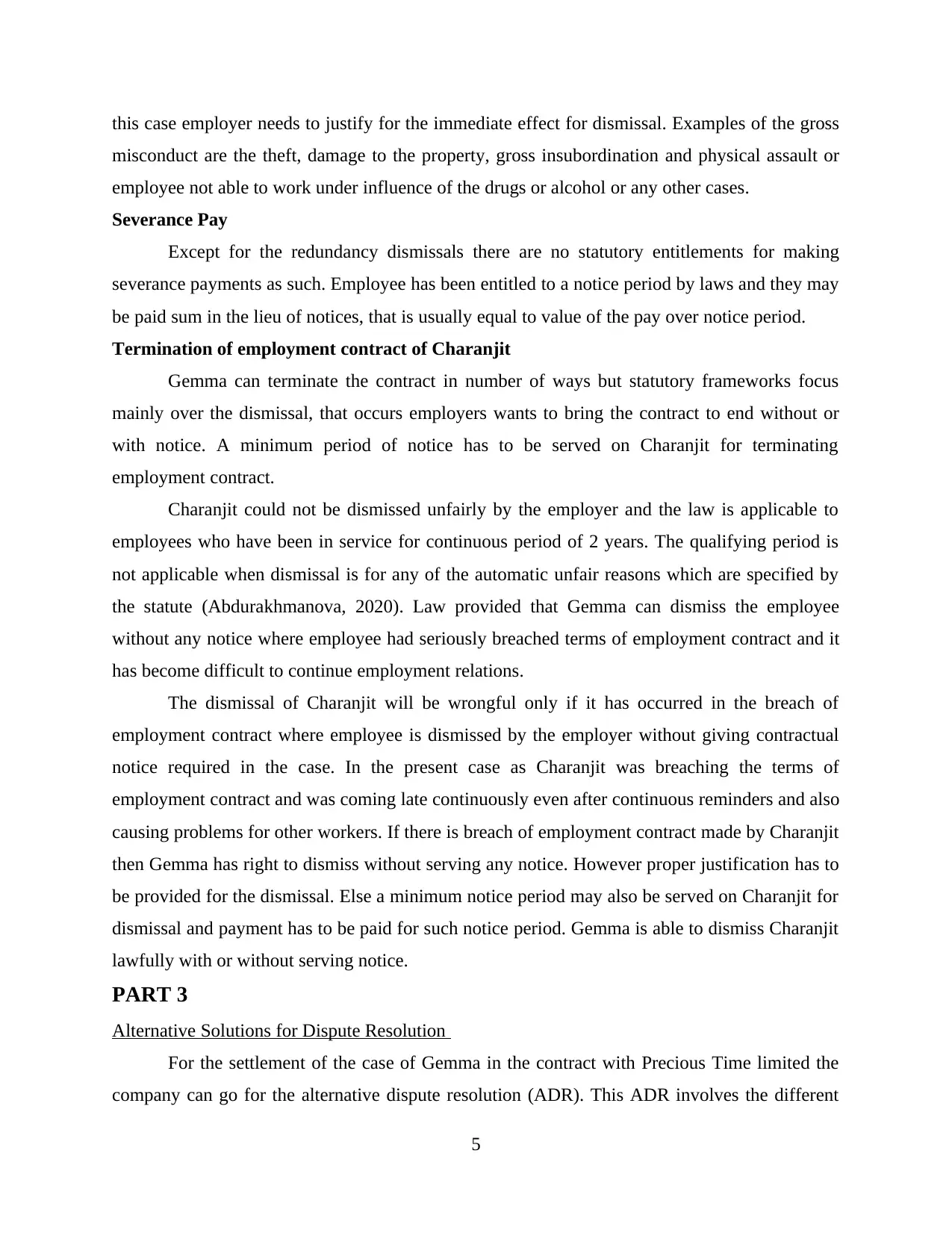
this case employer needs to justify for the immediate effect for dismissal. Examples of the gross
misconduct are the theft, damage to the property, gross insubordination and physical assault or
employee not able to work under influence of the drugs or alcohol or any other cases.
Severance Pay
Except for the redundancy dismissals there are no statutory entitlements for making
severance payments as such. Employee has been entitled to a notice period by laws and they may
be paid sum in the lieu of notices, that is usually equal to value of the pay over notice period.
Termination of employment contract of Charanjit
Gemma can terminate the contract in number of ways but statutory frameworks focus
mainly over the dismissal, that occurs employers wants to bring the contract to end without or
with notice. A minimum period of notice has to be served on Charanjit for terminating
employment contract.
Charanjit could not be dismissed unfairly by the employer and the law is applicable to
employees who have been in service for continuous period of 2 years. The qualifying period is
not applicable when dismissal is for any of the automatic unfair reasons which are specified by
the statute (Abdurakhmanova, 2020). Law provided that Gemma can dismiss the employee
without any notice where employee had seriously breached terms of employment contract and it
has become difficult to continue employment relations.
The dismissal of Charanjit will be wrongful only if it has occurred in the breach of
employment contract where employee is dismissed by the employer without giving contractual
notice required in the case. In the present case as Charanjit was breaching the terms of
employment contract and was coming late continuously even after continuous reminders and also
causing problems for other workers. If there is breach of employment contract made by Charanjit
then Gemma has right to dismiss without serving any notice. However proper justification has to
be provided for the dismissal. Else a minimum notice period may also be served on Charanjit for
dismissal and payment has to be paid for such notice period. Gemma is able to dismiss Charanjit
lawfully with or without serving notice.
PART 3
Alternative Solutions for Dispute Resolution
For the settlement of the case of Gemma in the contract with Precious Time limited the
company can go for the alternative dispute resolution (ADR). This ADR involves the different
5
misconduct are the theft, damage to the property, gross insubordination and physical assault or
employee not able to work under influence of the drugs or alcohol or any other cases.
Severance Pay
Except for the redundancy dismissals there are no statutory entitlements for making
severance payments as such. Employee has been entitled to a notice period by laws and they may
be paid sum in the lieu of notices, that is usually equal to value of the pay over notice period.
Termination of employment contract of Charanjit
Gemma can terminate the contract in number of ways but statutory frameworks focus
mainly over the dismissal, that occurs employers wants to bring the contract to end without or
with notice. A minimum period of notice has to be served on Charanjit for terminating
employment contract.
Charanjit could not be dismissed unfairly by the employer and the law is applicable to
employees who have been in service for continuous period of 2 years. The qualifying period is
not applicable when dismissal is for any of the automatic unfair reasons which are specified by
the statute (Abdurakhmanova, 2020). Law provided that Gemma can dismiss the employee
without any notice where employee had seriously breached terms of employment contract and it
has become difficult to continue employment relations.
The dismissal of Charanjit will be wrongful only if it has occurred in the breach of
employment contract where employee is dismissed by the employer without giving contractual
notice required in the case. In the present case as Charanjit was breaching the terms of
employment contract and was coming late continuously even after continuous reminders and also
causing problems for other workers. If there is breach of employment contract made by Charanjit
then Gemma has right to dismiss without serving any notice. However proper justification has to
be provided for the dismissal. Else a minimum notice period may also be served on Charanjit for
dismissal and payment has to be paid for such notice period. Gemma is able to dismiss Charanjit
lawfully with or without serving notice.
PART 3
Alternative Solutions for Dispute Resolution
For the settlement of the case of Gemma in the contract with Precious Time limited the
company can go for the alternative dispute resolution (ADR). This ADR involves the different
5
Paraphrase This Document
Need a fresh take? Get an instant paraphrase of this document with our AI Paraphraser
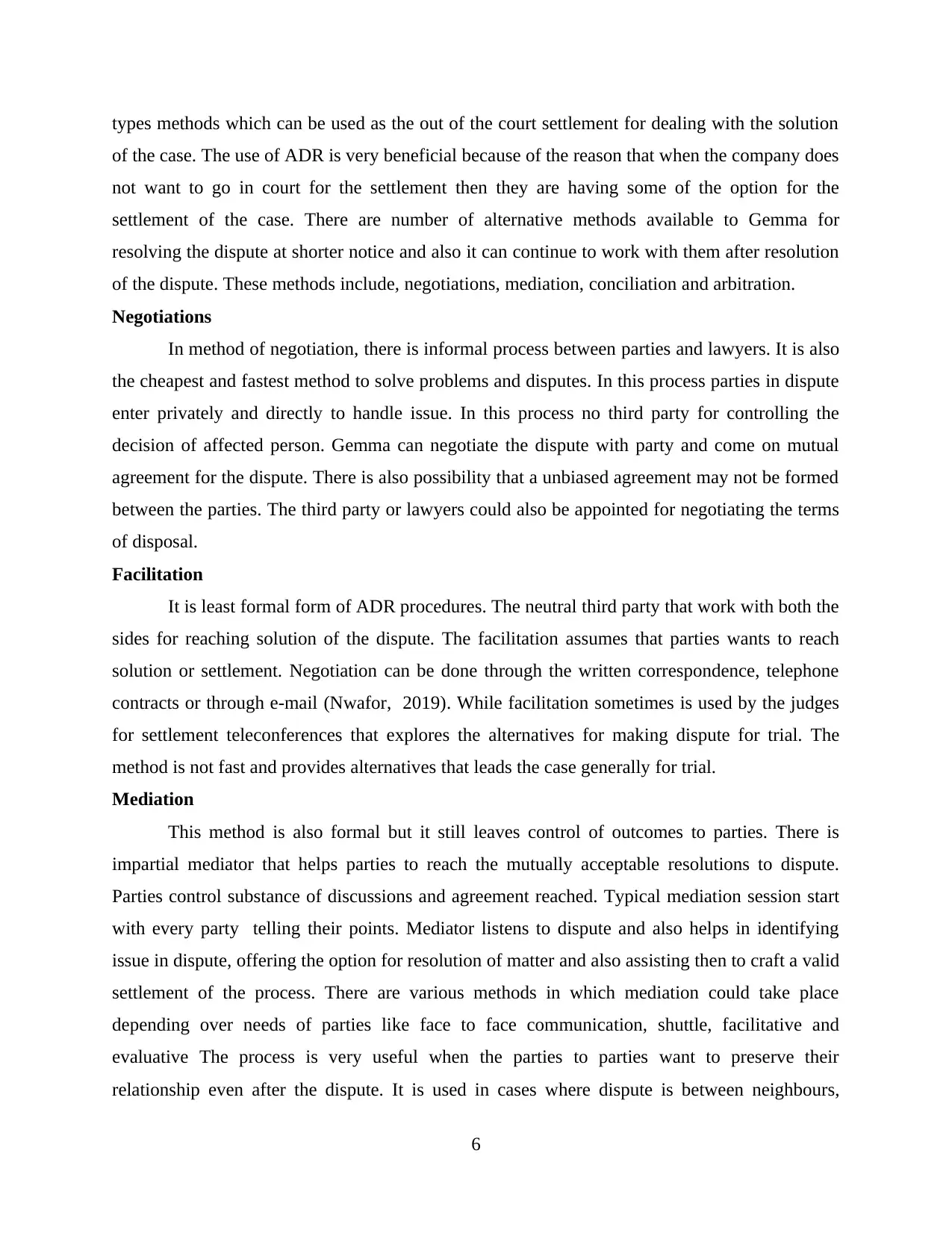
types methods which can be used as the out of the court settlement for dealing with the solution
of the case. The use of ADR is very beneficial because of the reason that when the company does
not want to go in court for the settlement then they are having some of the option for the
settlement of the case. There are number of alternative methods available to Gemma for
resolving the dispute at shorter notice and also it can continue to work with them after resolution
of the dispute. These methods include, negotiations, mediation, conciliation and arbitration.
Negotiations
In method of negotiation, there is informal process between parties and lawyers. It is also
the cheapest and fastest method to solve problems and disputes. In this process parties in dispute
enter privately and directly to handle issue. In this process no third party for controlling the
decision of affected person. Gemma can negotiate the dispute with party and come on mutual
agreement for the dispute. There is also possibility that a unbiased agreement may not be formed
between the parties. The third party or lawyers could also be appointed for negotiating the terms
of disposal.
Facilitation
It is least formal form of ADR procedures. The neutral third party that work with both the
sides for reaching solution of the dispute. The facilitation assumes that parties wants to reach
solution or settlement. Negotiation can be done through the written correspondence, telephone
contracts or through e-mail (Nwafor, 2019). While facilitation sometimes is used by the judges
for settlement teleconferences that explores the alternatives for making dispute for trial. The
method is not fast and provides alternatives that leads the case generally for trial.
Mediation
This method is also formal but it still leaves control of outcomes to parties. There is
impartial mediator that helps parties to reach the mutually acceptable resolutions to dispute.
Parties control substance of discussions and agreement reached. Typical mediation session start
with every party telling their points. Mediator listens to dispute and also helps in identifying
issue in dispute, offering the option for resolution of matter and also assisting then to craft a valid
settlement of the process. There are various methods in which mediation could take place
depending over needs of parties like face to face communication, shuttle, facilitative and
evaluative The process is very useful when the parties to parties want to preserve their
relationship even after the dispute. It is used in cases where dispute is between neighbours,
6
of the case. The use of ADR is very beneficial because of the reason that when the company does
not want to go in court for the settlement then they are having some of the option for the
settlement of the case. There are number of alternative methods available to Gemma for
resolving the dispute at shorter notice and also it can continue to work with them after resolution
of the dispute. These methods include, negotiations, mediation, conciliation and arbitration.
Negotiations
In method of negotiation, there is informal process between parties and lawyers. It is also
the cheapest and fastest method to solve problems and disputes. In this process parties in dispute
enter privately and directly to handle issue. In this process no third party for controlling the
decision of affected person. Gemma can negotiate the dispute with party and come on mutual
agreement for the dispute. There is also possibility that a unbiased agreement may not be formed
between the parties. The third party or lawyers could also be appointed for negotiating the terms
of disposal.
Facilitation
It is least formal form of ADR procedures. The neutral third party that work with both the
sides for reaching solution of the dispute. The facilitation assumes that parties wants to reach
solution or settlement. Negotiation can be done through the written correspondence, telephone
contracts or through e-mail (Nwafor, 2019). While facilitation sometimes is used by the judges
for settlement teleconferences that explores the alternatives for making dispute for trial. The
method is not fast and provides alternatives that leads the case generally for trial.
Mediation
This method is also formal but it still leaves control of outcomes to parties. There is
impartial mediator that helps parties to reach the mutually acceptable resolutions to dispute.
Parties control substance of discussions and agreement reached. Typical mediation session start
with every party telling their points. Mediator listens to dispute and also helps in identifying
issue in dispute, offering the option for resolution of matter and also assisting then to craft a valid
settlement of the process. There are various methods in which mediation could take place
depending over needs of parties like face to face communication, shuttle, facilitative and
evaluative The process is very useful when the parties to parties want to preserve their
relationship even after the dispute. It is used in cases where dispute is between neighbours,
6
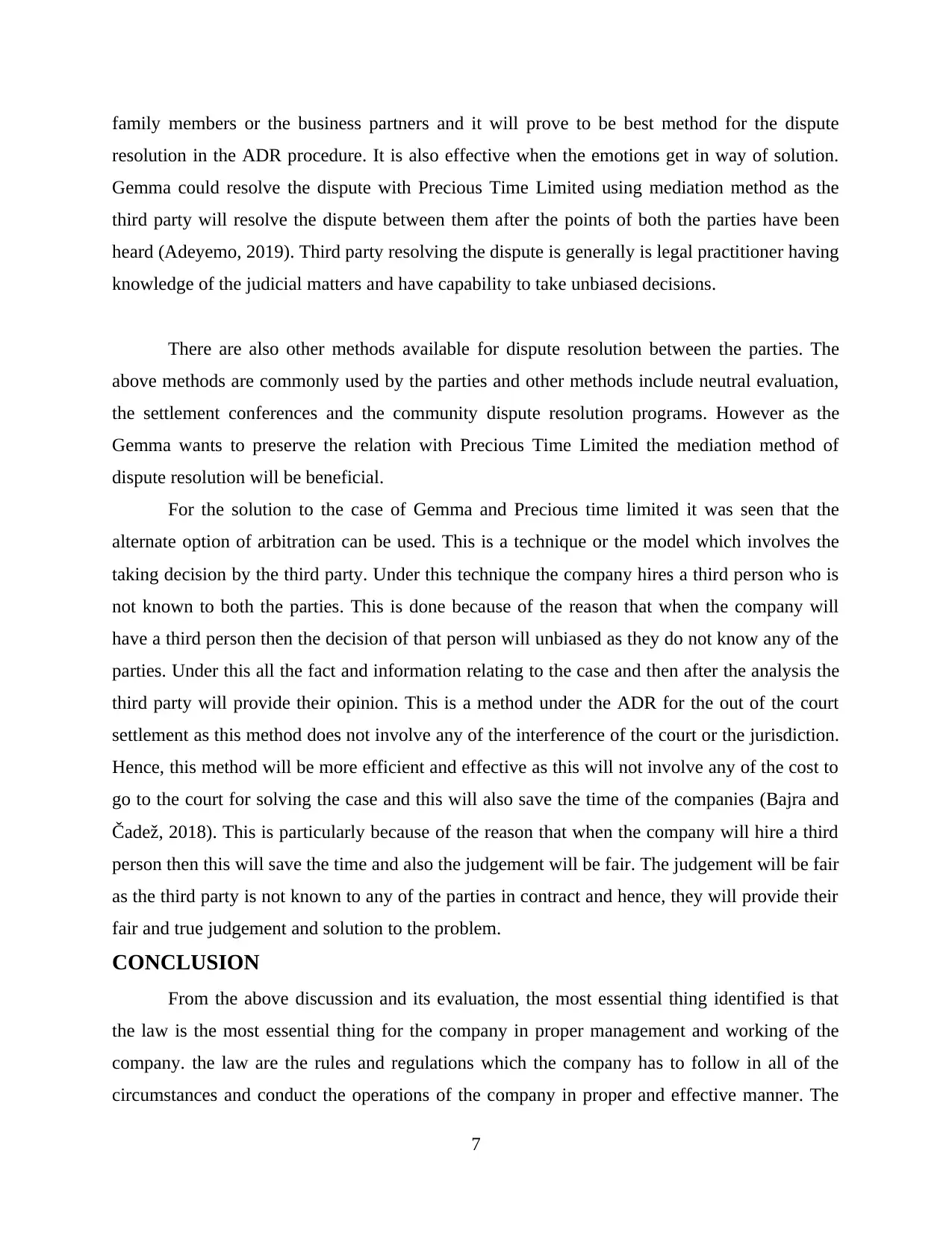
family members or the business partners and it will prove to be best method for the dispute
resolution in the ADR procedure. It is also effective when the emotions get in way of solution.
Gemma could resolve the dispute with Precious Time Limited using mediation method as the
third party will resolve the dispute between them after the points of both the parties have been
heard (Adeyemo, 2019). Third party resolving the dispute is generally is legal practitioner having
knowledge of the judicial matters and have capability to take unbiased decisions.
There are also other methods available for dispute resolution between the parties. The
above methods are commonly used by the parties and other methods include neutral evaluation,
the settlement conferences and the community dispute resolution programs. However as the
Gemma wants to preserve the relation with Precious Time Limited the mediation method of
dispute resolution will be beneficial.
For the solution to the case of Gemma and Precious time limited it was seen that the
alternate option of arbitration can be used. This is a technique or the model which involves the
taking decision by the third party. Under this technique the company hires a third person who is
not known to both the parties. This is done because of the reason that when the company will
have a third person then the decision of that person will unbiased as they do not know any of the
parties. Under this all the fact and information relating to the case and then after the analysis the
third party will provide their opinion. This is a method under the ADR for the out of the court
settlement as this method does not involve any of the interference of the court or the jurisdiction.
Hence, this method will be more efficient and effective as this will not involve any of the cost to
go to the court for solving the case and this will also save the time of the companies (Bajra and
Čadež, 2018). This is particularly because of the reason that when the company will hire a third
person then this will save the time and also the judgement will be fair. The judgement will be fair
as the third party is not known to any of the parties in contract and hence, they will provide their
fair and true judgement and solution to the problem.
CONCLUSION
From the above discussion and its evaluation, the most essential thing identified is that
the law is the most essential thing for the company in proper management and working of the
company. the law are the rules and regulations which the company has to follow in all of the
circumstances and conduct the operations of the company in proper and effective manner. The
7
resolution in the ADR procedure. It is also effective when the emotions get in way of solution.
Gemma could resolve the dispute with Precious Time Limited using mediation method as the
third party will resolve the dispute between them after the points of both the parties have been
heard (Adeyemo, 2019). Third party resolving the dispute is generally is legal practitioner having
knowledge of the judicial matters and have capability to take unbiased decisions.
There are also other methods available for dispute resolution between the parties. The
above methods are commonly used by the parties and other methods include neutral evaluation,
the settlement conferences and the community dispute resolution programs. However as the
Gemma wants to preserve the relation with Precious Time Limited the mediation method of
dispute resolution will be beneficial.
For the solution to the case of Gemma and Precious time limited it was seen that the
alternate option of arbitration can be used. This is a technique or the model which involves the
taking decision by the third party. Under this technique the company hires a third person who is
not known to both the parties. This is done because of the reason that when the company will
have a third person then the decision of that person will unbiased as they do not know any of the
parties. Under this all the fact and information relating to the case and then after the analysis the
third party will provide their opinion. This is a method under the ADR for the out of the court
settlement as this method does not involve any of the interference of the court or the jurisdiction.
Hence, this method will be more efficient and effective as this will not involve any of the cost to
go to the court for solving the case and this will also save the time of the companies (Bajra and
Čadež, 2018). This is particularly because of the reason that when the company will hire a third
person then this will save the time and also the judgement will be fair. The judgement will be fair
as the third party is not known to any of the parties in contract and hence, they will provide their
fair and true judgement and solution to the problem.
CONCLUSION
From the above discussion and its evaluation, the most essential thing identified is that
the law is the most essential thing for the company in proper management and working of the
company. the law are the rules and regulations which the company has to follow in all of the
circumstances and conduct the operations of the company in proper and effective manner. The
7
⊘ This is a preview!⊘
Do you want full access?
Subscribe today to unlock all pages.

Trusted by 1+ million students worldwide
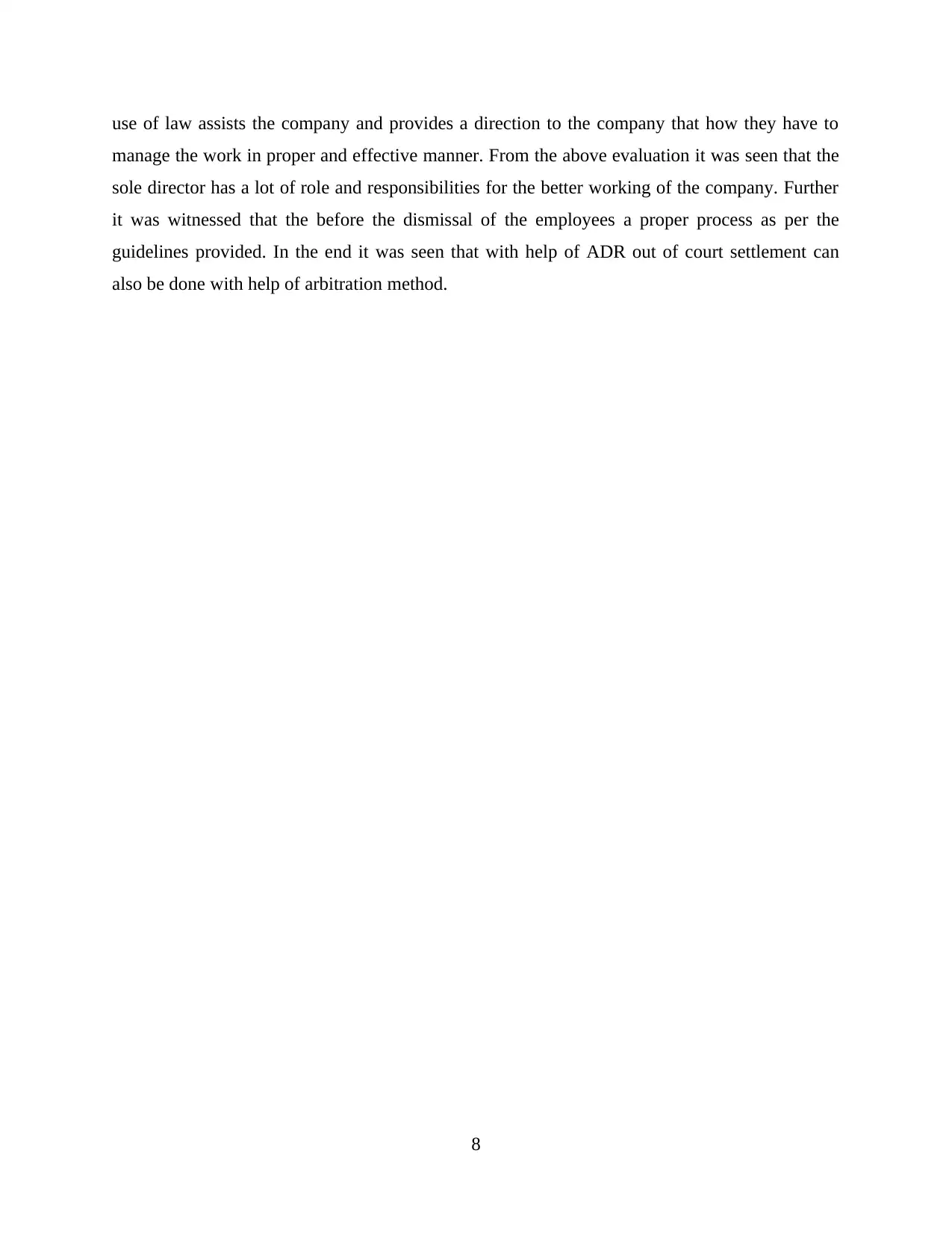
use of law assists the company and provides a direction to the company that how they have to
manage the work in proper and effective manner. From the above evaluation it was seen that the
sole director has a lot of role and responsibilities for the better working of the company. Further
it was witnessed that the before the dismissal of the employees a proper process as per the
guidelines provided. In the end it was seen that with help of ADR out of court settlement can
also be done with help of arbitration method.
8
manage the work in proper and effective manner. From the above evaluation it was seen that the
sole director has a lot of role and responsibilities for the better working of the company. Further
it was witnessed that the before the dismissal of the employees a proper process as per the
guidelines provided. In the end it was seen that with help of ADR out of court settlement can
also be done with help of arbitration method.
8
Paraphrase This Document
Need a fresh take? Get an instant paraphrase of this document with our AI Paraphraser
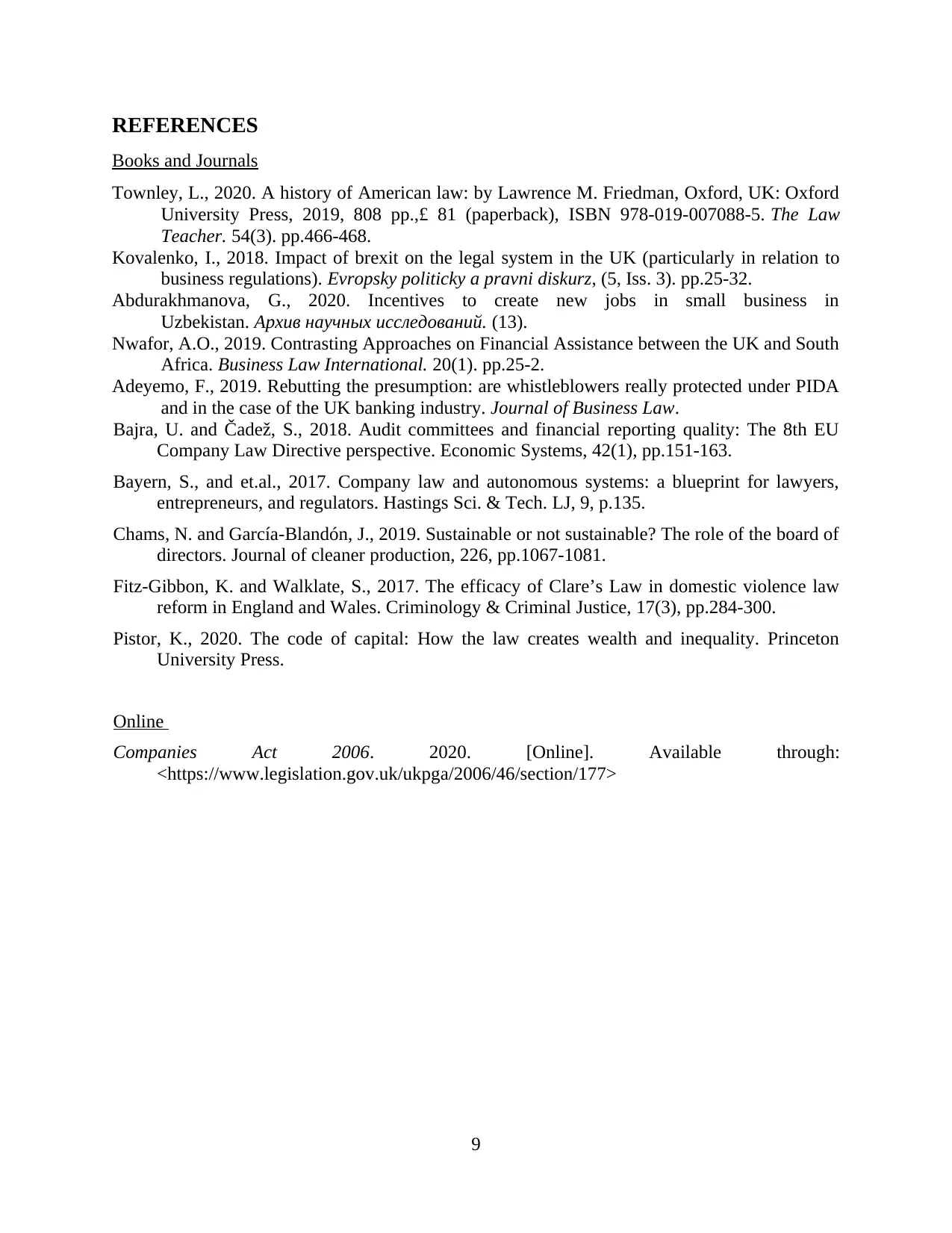
REFERENCES
Books and Journals
Townley, L., 2020. A history of American law: by Lawrence M. Friedman, Oxford, UK: Oxford
University Press, 2019, 808 pp.,£ 81 (paperback), ISBN 978-019-007088-5. The Law
Teacher. 54(3). pp.466-468.
Kovalenko, I., 2018. Impact of brexit on the legal system in the UK (particularly in relation to
business regulations). Evropsky politicky a pravni diskurz, (5, Iss. 3). pp.25-32.
Abdurakhmanova, G., 2020. Incentives to create new jobs in small business in
Uzbekistan. Архив научных исследований. (13).
Nwafor, A.O., 2019. Contrasting Approaches on Financial Assistance between the UK and South
Africa. Business Law International. 20(1). pp.25-2.
Adeyemo, F., 2019. Rebutting the presumption: are whistleblowers really protected under PIDA
and in the case of the UK banking industry. Journal of Business Law.
Bajra, U. and Čadež, S., 2018. Audit committees and financial reporting quality: The 8th EU
Company Law Directive perspective. Economic Systems, 42(1), pp.151-163.
Bayern, S., and et.al., 2017. Company law and autonomous systems: a blueprint for lawyers,
entrepreneurs, and regulators. Hastings Sci. & Tech. LJ, 9, p.135.
Chams, N. and García-Blandón, J., 2019. Sustainable or not sustainable? The role of the board of
directors. Journal of cleaner production, 226, pp.1067-1081.
Fitz-Gibbon, K. and Walklate, S., 2017. The efficacy of Clare’s Law in domestic violence law
reform in England and Wales. Criminology & Criminal Justice, 17(3), pp.284-300.
Pistor, K., 2020. The code of capital: How the law creates wealth and inequality. Princeton
University Press.
Online
Companies Act 2006. 2020. [Online]. Available through:
<https://www.legislation.gov.uk/ukpga/2006/46/section/177>
9
Books and Journals
Townley, L., 2020. A history of American law: by Lawrence M. Friedman, Oxford, UK: Oxford
University Press, 2019, 808 pp.,£ 81 (paperback), ISBN 978-019-007088-5. The Law
Teacher. 54(3). pp.466-468.
Kovalenko, I., 2018. Impact of brexit on the legal system in the UK (particularly in relation to
business regulations). Evropsky politicky a pravni diskurz, (5, Iss. 3). pp.25-32.
Abdurakhmanova, G., 2020. Incentives to create new jobs in small business in
Uzbekistan. Архив научных исследований. (13).
Nwafor, A.O., 2019. Contrasting Approaches on Financial Assistance between the UK and South
Africa. Business Law International. 20(1). pp.25-2.
Adeyemo, F., 2019. Rebutting the presumption: are whistleblowers really protected under PIDA
and in the case of the UK banking industry. Journal of Business Law.
Bajra, U. and Čadež, S., 2018. Audit committees and financial reporting quality: The 8th EU
Company Law Directive perspective. Economic Systems, 42(1), pp.151-163.
Bayern, S., and et.al., 2017. Company law and autonomous systems: a blueprint for lawyers,
entrepreneurs, and regulators. Hastings Sci. & Tech. LJ, 9, p.135.
Chams, N. and García-Blandón, J., 2019. Sustainable or not sustainable? The role of the board of
directors. Journal of cleaner production, 226, pp.1067-1081.
Fitz-Gibbon, K. and Walklate, S., 2017. The efficacy of Clare’s Law in domestic violence law
reform in England and Wales. Criminology & Criminal Justice, 17(3), pp.284-300.
Pistor, K., 2020. The code of capital: How the law creates wealth and inequality. Princeton
University Press.
Online
Companies Act 2006. 2020. [Online]. Available through:
<https://www.legislation.gov.uk/ukpga/2006/46/section/177>
9
1 out of 11
Related Documents
Your All-in-One AI-Powered Toolkit for Academic Success.
+13062052269
info@desklib.com
Available 24*7 on WhatsApp / Email
![[object Object]](/_next/static/media/star-bottom.7253800d.svg)
Unlock your academic potential
Copyright © 2020–2026 A2Z Services. All Rights Reserved. Developed and managed by ZUCOL.





